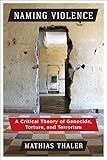Naming Violence : A Critical Theory of Genocide, Torture, and Terrorism / Mathias Thaler.
Material type: TextSeries: New Directions in Critical Theory ; 52Publisher: New York, NY : Columbia University Press, [2018]Copyright date: ©2018Description: 1 online resourceContent type:
TextSeries: New Directions in Critical Theory ; 52Publisher: New York, NY : Columbia University Press, [2018]Copyright date: ©2018Description: 1 online resourceContent type: - 9780231188142
- 9780231547680
- 303.6 23
- JC328.6
- online - DeGruyter
- Issued also in print.
| Item type | Current library | Call number | URL | Status | Notes | Barcode | |
|---|---|---|---|---|---|---|---|
 eBook
eBook
|
Biblioteca "Angelicum" Pont. Univ. S.Tommaso d'Aquino Nuvola online | online - DeGruyter (Browse shelf(Opens below)) | Online access | Not for loan (Accesso limitato) | Accesso per gli utenti autorizzati / Access for authorized users | (dgr)9780231547680 |
Frontmatter -- Contents -- Acknowledgments -- 1. POLITICAL THEORY BETWEEN MORALISM AND REALISM -- 2. TELLING STORIES: ON ART'S ROLE IN DISPELLING GENOCIDE BLINDNESS -- 3. HOW TO DO THINGS WITH HYPOTHETICALS: ASSESSING THOUGHT EXPERIMENTS ABOUT TORTURE -- 4. GENEALOGY AS CRITIQUE: PROBLEMATIZING DEFINITIONS OF TERRORISM -- 5. THE CONCEPTUAL TAPESTRY OF POLITICAL VIOLENCE -- Notes -- Bibliography -- Index
restricted access online access with authorization star
http://purl.org/coar/access_right/c_16ec
Much is at stake when we choose a word for a form of violence: whether a conflict is labeled civil war or genocide, whether we refer to "enhanced interrogation techniques" or to "torture," whether a person is called a "terrorist" or a "patriot." Do these decisions reflect the rigorous application of commonly accepted criteria, or are they determined by power structures and partisanship? How is the language we use for violence entangled with the fight against it?In Naming Violence, Mathias Thaler articulates a novel perspective on the study of violence that demonstrates why the imagination matters for political theory. His analysis of the politics of naming charts a middle ground between moralism and realism, arguing that political theory ought to question whether our existing vocabulary enables us to properly identify, understand, and respond to violence. He explores how narrative art, thought experiments, and historical events can challenge and enlarge our existing ways of thinking about violence. Through storytelling, hypothetical situations, and genealogies, the imagination can help us see when definitions of violence need to be revisited by shedding new light on prevalent norms and uncovering the contingent history of ostensibly self-evident beliefs. Naming Violence demonstrates the importance of political theory to debates about violence across a number of different disciplines from film studies to history.
Issued also in print.
Mode of access: Internet via World Wide Web.
In English.
Description based on online resource; title from PDF title page (publisher's Web site, viewed 29. Mrz 2022)


